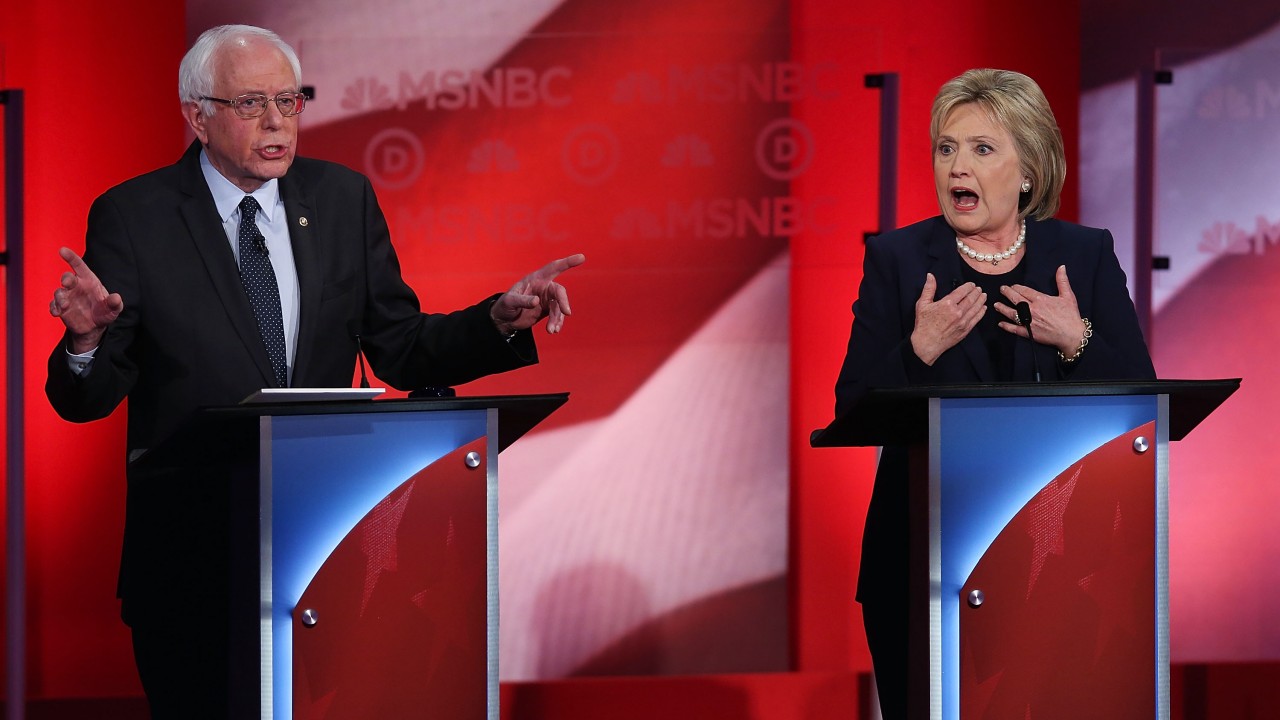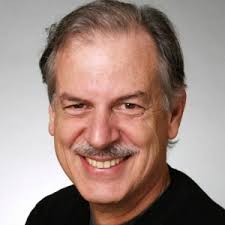
Democratic presidential candidates Hillary Clinton and Bernie Sanders during their MSNBC Democratic Candidates Debate at the University of New Hampshire on February 4, 2016 in Durham, New Hampshire. (Photo: Justin Sullivan/Getty Images)
This post originally appeared at OurFuture.org.
Hillary Clinton’s heated defense of the money she has raised from Wall Street and other interests won’t cut it. Her protests contradict the basic case that virtually all Democrats and reformers have made for getting big money out of politics. It is vital that voters not be misled by them.
Normally, liberal politicians defend setting up super PACs, and collecting large sums from big donors, because while they pledge to curb the influence of the rich and corporations in our politics if elected, they can’t “unilaterally disarm.” Clinton repeats this argument, but it has less force against Bernie Sanders who not only has made the corrosive effect of big money contributions central to his campaign, but has demonstrated that it is possible to be competitive without setting up super PACs and without asking billionaires and millionaires for money. By funding his campaign with small donations raised online, Sanders has not only walked his talk, he’s stripped away the easy defense of “they all do it.”
In response, Clinton has put forth additional, but troublesome, arguments. She dismisses Sanders’ indictment of her funding ties as an unjustified attack on her character. She demands evidence of a specific vote or act that was done in return for a contribution. And she invokes the Obama defense: President Obama collected big bucks from Wall Street and yet went on to pass the most extensive banking reforms since the Great Depression.
Not Character, Common Sense
Few Democrats doubt that big money corrupts our politics. This economy does not work for working people because the rules have been rigged to favor the few. They are rigged by politicians and officials who too often are more responsive to their donors than to the voters who put them in office.
This argument is not controversial. Academic research confirms it. Politicians in both parties bemoan the hours they spend each day soliciting rich donors or schmoozing with lobbyists at unceasing fundraisers. Virtually all Democrats argue that we have to curb big money in politics. They’re united in calling for overturning Citizens United and the other Supreme Court decisions that have opened the floodgates to unlimited, often secret corporate money in our politics.
When Sanders questions Clinton about her funding from Wall Street, her speeches to big banks and other interests that brought her millions personally, and her array of super PACs, she charges Sanders with making “false character attacks.” But the influence of campaign contributions isn’t about character, it is about association, gratitude and access.
No Democrat doubts President Obama’s character. Yet, he wrote in the Audacity of Hope about the “money chase:” “As a consequence of my fundraising I became more like the wealthy donors I met, in the very particular sense that I spent more and more of my time above the fray, outside the world of immediate hunger, disappointment, fear, irrationality and frequent hardship of the other 99 percent of the population – that is the people I’d entered public life to serve.”
This isn’t about character. The “money chase” forces politicians, including Secretary Clinton, to spend immense time soliciting for deep-pocket donations. Her contributors get access, earn gratitude, and get a hearing for whatever case they want to make. Politicians learn what subjects to avoid, and begin to echo views widely shared among the donor class. Sanders indicts Clinton’s fundraising not because he believes she is particularly corrupt, but because he knows she is human.
Not Bribery, World View
In the debates, moderators and Secretary Clinton have repeatedly demanded that Sanders provide an example of a specific quid pro quo: show where she voted or acted in return for a contribution. This would be bribery, and very hard to prove even with subpoena power. Sanders’s defenders often point to her flip to vote against the bankruptcy bill after getting thousands in contributions from the banking lobby, as suggested by Sen. Elizabeth Warren (D-MA). Clinton argues that the bill was amended to include things she liked. We’re left to draw our own conclusions.
But this is simply not the point. Secretary Clinton, like most Democrats, supports overturning Citizens United. She even says this would be a litmus test for any potential Supreme Court nominee. But Citizens United reaffirms that bribery – a quid pro quo exchange of a vote for a contribution – is illegal. What makes Citizens United offensive is that it limits corruption to that very narrow category, and declares money outside of that limit protected speech. It ridiculously ignores the far greater corrupting effects of big money on our politics and our politicians. That is why Democrats and reformers rail against it.
And this isn’t simply about secret donations. Justice Anthony Kennedy, writing for the conservative majority, assumes that Congress will pass disclosure laws, and that publication will suffice for the democracy. Reformers, including Clinton, call for overturning Citizens United and related cases not because of secret money, but because they are stripping away any restrictions on big donations by corporations and the rich. All assume that this is offensive to and corrupting of our democracy.
Obama: More Indictment Than Defense
In response to Sanders, Clinton returns frequently to her Obama defense: “Make no mistake about it, this is not just an attack on me, it’s an attack on President Obama. President Obama had a super PAC when he ran. President Obama took tens of millions of dollars from contributors. And President Obama was not at all influenced when he made the decision to pass and sign Dodd-Frank, the toughest regulations on Wall Street in many a year.”
But Obama’s administration is, in fact, more a testament to the power of money. What the FBI termed “an epidemic of fraud” by the big banks and others was central to the Wall Street wilding that blew up the economy and led to the Great Recession. Yet the big banks were bailed out, while millions of homeowners were left to sink. Americans lost jobs, homes and incomes, but not only were the banks bailed out, but the bankers were left in their jobs, and not one has gone to jail or was stripped of his or her ill-gotten fortunes. And the banks have ended bigger and more concentrated than before, and are still, as the Federal Reserve just announced, too big to fail.
This isn’t because the bankers were innocent. The Justice Department has collected literally hundreds of billions of fines from the big banks for a range of fraudulent and criminal activities. The banks were fined, but no major banker was held accountable. Apparently banks somehow commit crimes without bankers being involved.
Why is that? As Elizabeth Warren has stated, personnel is policy. President Obama staffed his administration at its highest levels with former bankers and corporate lawyers. The Attorney General and the head of the criminal division came from and returned to a corporate law firm representing many of the bankers that should have been prosecuted. Not surprisingly, they worried publicly that prosecuting the banks might endanger the recovery.
Citibank received the largest bailout from the federal government. It would have gone belly up without it. It misled investors about the billions in toxic mortgage bonds it held. The Financial Crisis Inquiry Commission called on the Justice Department to consider criminal charges against its leaders, including Robert Rubin, Clinton’s former Treasury Secretary, and one of Obama’s major patrons. The referral was not pursued.
Why didn’t the SEC bring civil charges and demand criminal prosecution of bankers who brought the world economy down in an “epidemic of fraud?” Perhaps one reason is that the head of enforcement at the SEC, Robert Khuzami, was general counsel of the Americas for Deutsche Bank from 2004-2009, a bank at the center of the fraud.
This isn’t about character, bribery (quid pro quos) or secrecy. Money oils the revolving door that insures the rich are well represented in any administration. The corrupting influence of big money is that is provides access to politicians, and influences their world view. In the course of repeating her defense to the editors of The Philadelphia Inquirer, Secretary Clinton noted that:
“People have been supporting me over my political life since 1999…. [T]here have been many [instances] where people have said, ‘would I look into this.’ I always say I will look into something, but I always tell people there is no guarantee … that you are going to like my answer.” [emphasis added]
Exactly. The big donors have access to express their concerns, to make their case. The server at McDonald’s doesn’t get a personal audience with the candidate to explain why a $15.00 minimum wage and a union are so vital. An inner city mother can’t get an audience to explain why closing down the local school is so devastating. Middle income parents, hit with rising copays and drug costs, can’t get a meeting to argue for moving to Medicare for all. Pay-to-play isn’t simply alliteration; it is central to how the rules get rigged.
The “money chase” slowly, imperceptibly influences the worldview of politicians. It influences who they think is important, what views they think are reputable. Donors become confidants who recommend the “right” people for high office.
No one has described this corrosion better than President Obama. Again, in The Audacity of Hope, he wrote about a politician headed into his or her next big election, when no longer a fresh face:
“The path of least resistance – of fundraisers organized by the special interests, the corporate PACs and the top lobbying shops – starts to look awfully tempting, and if the opinions of these insiders don’t quite jibe with those you once held, you learn to rationalize the changes as a matter of realism, of compromise, of learning the ropes. The problems of ordinary people, the voices of the Rust Belt town or the dwindling heartland, become a distant echo rather than a palpable reality, abstractions to be managed rather than battles to be fought.” [emphasis added]
Imperative That Sanders Press This Case
The Clinton campaign has unleashed a flood of criticism of Sanders for being too negative. They call on him to stop talking about her Wall Street contributions and lecture fees. In fact, Sanders has been the most restrained of opponents. Just wait for one week of the Trump campaign’s assault in comparison.
Sanders indicts big money in politics not out of personal enmity, but because he understands how it is undermining our democracy.
Most Democrats, certainly all reformers including Clinton, embrace the substance of the arguments he makes. Secretary Clinton is well on her way to the nomination, but no Democrat should adopt the situational arguments Clinton uses to defend her fundraising. The Democratic Party must be clear that it stands for curbing the role of big money and private interests in politics, for cleaning out the stables in Washington and for making politicians responsive to the people who vote for them, not the corporations and wealthy who fund them.
This surely will be one of the issues that Sanders carries into the convention. And it is one that Democrats and Clinton should adopt as central to their platform.




